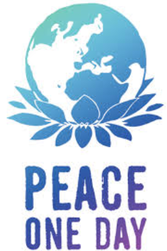
The World Food Programme dropped food aid in Southern Sudan, and the International Rescue Committee repatriated a child soldier with her family. Initiatives have flourished since then, as Peace One Day has partnered with a number of UN agencies, governments, and non-governmental organisations. Many children have received immunization against polio and other serious illnesses.
In the report compiled after the 2012 event, it was determined that 4% of the world's population are aware of Peace One Day, and 2% engage actively in participating in more peaceful activities as a result of it. Outreach programs in peaceful countries focus on making peace in our own homes and communities, with a focus on ending bullying, and domestic or gender-based violence. The theme for 2013 is: "who will you make peace with?" My problem is this: the people committing and encouraging bullying and gender-based violence in my homeland (Zimbabwe) are the police. Mugabe openly admits that he’s not above working outside of thelaw, and believes the way to a peaceful election is to suppress any opposition.
Women are arrested 'for prostitution' because they walk alone after dark. All of the rapes within my circle of friends have included interrogations about political loyalties (See example storyhere). Half the women in our prison system were arrested for infanticide; in the opinion of a psychiatrist who works with the inmates, the majority of infanticide is the result of undiagnosed and untreated post-partum depression and the rest is because we have no public abortion facilities (if you can afford private healthcare, there are a few practitioners who don’t preach at women seeking abortions).
| The Zimbabwean government doesn't live up to any sort of diversity program either. In the 1980s, Mugabe attempted to commit genocide against the Ndebele people. He has declared whites the enemy of the state, and said that the only white man you can trust is a dead one. He even gave aninterview in which he declared that he was better than Mandela, because Mandela was 'too soft' on policy regarding white and gay South Africans. | How can we hope for justice in a country where the highest bidder can secure a verdict, depending which judge is presiding |
Aside from specific acts of hate, our government is not above using intimidation for their own goals. The police regularly set up roadblocks with the aim of finding minor offenses that they can fine; alternatively, they try to extort 'spot fines' that are at least double (often up to or more than five times) the recommended amount, but the offender doesn't have to sign an Admission of Guilt form. The 'spot fine' system has led to roadblocks being nicknamed 'police ATMs'. Government-paid paramilitary burned people with herbicide, and had rape camps in the build up to our 2008 elections. Just to clarify, a rape camp is a farm where women are taken in trucks - having been forced to board them at gun-point - gang raped, and then dropped en masse at the nearest main road.
So how can we Zimbabweans ever hope for peace? How can we hope for justice in a country where the highest bidder can secure a verdict, depending which judge is presiding? How can we hope that one day, just maybe, we’ll be able to trust gun-carrying government employees?
By choosing peace. We can hope for those things if we choose to forgive and not pick fights. Our police force has been brainwashed into hating and bullying anyone who disagrees with their manifesto. We can feel self-righteous about choosing to not seek employment in organisations that consider genocide a legitimate conflict resolution strategy. Or we can understand that they've been given hate-filled propaganda for so long that they no longer question it. The bullying, shaming, and hate that they've been subjected to has coloured their world view so completely that they can't see goodness in anyone but themselves. Basically, the only way to disprove the propaganda - that whites are bent on re-colonising the country, that any kind of dissent is a violent threat, that everyone except the government is bent on destroying the country - is by living in a way that shows the lies for what they are.
The irony of trying to demonstrate peaceful living to a group of people whose CVs include acts tantamount to war crimes is not lost on me. I'm choosing to forgive and treat them as I want to be treated, but not because I approve of the government’s outlook and approach. I'm choosing peace and forgiveness, because we can’t unite as a community and re-build our nation any other way. To quote Jesus, a house divided against itself cannot stand; in other words, if we all cling to bitterness and hate, we’ll never have peace or make progress. So this Peace One Day, I'll be choosing to foster peace and unity with my countrymen, regardless of their political allegiances and chosen professions, because only love prevails.
Anonymous
Please forgive the sparseness of my sources for this article. People in Zimbabwe are afraid to speak out about the injustice they face, because criticizing the government is often viewed as treason by our police and security services; treason carries the death penalty in this country. I have used as many reliable sources as I could find, but it's the tip of the iceberg of stories we could all tell about what happens here. Unfortunately, personal stories of the Zimbabwean experience are not available online.


 RSS Feed
RSS Feed
